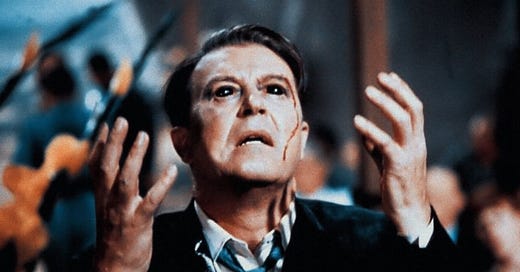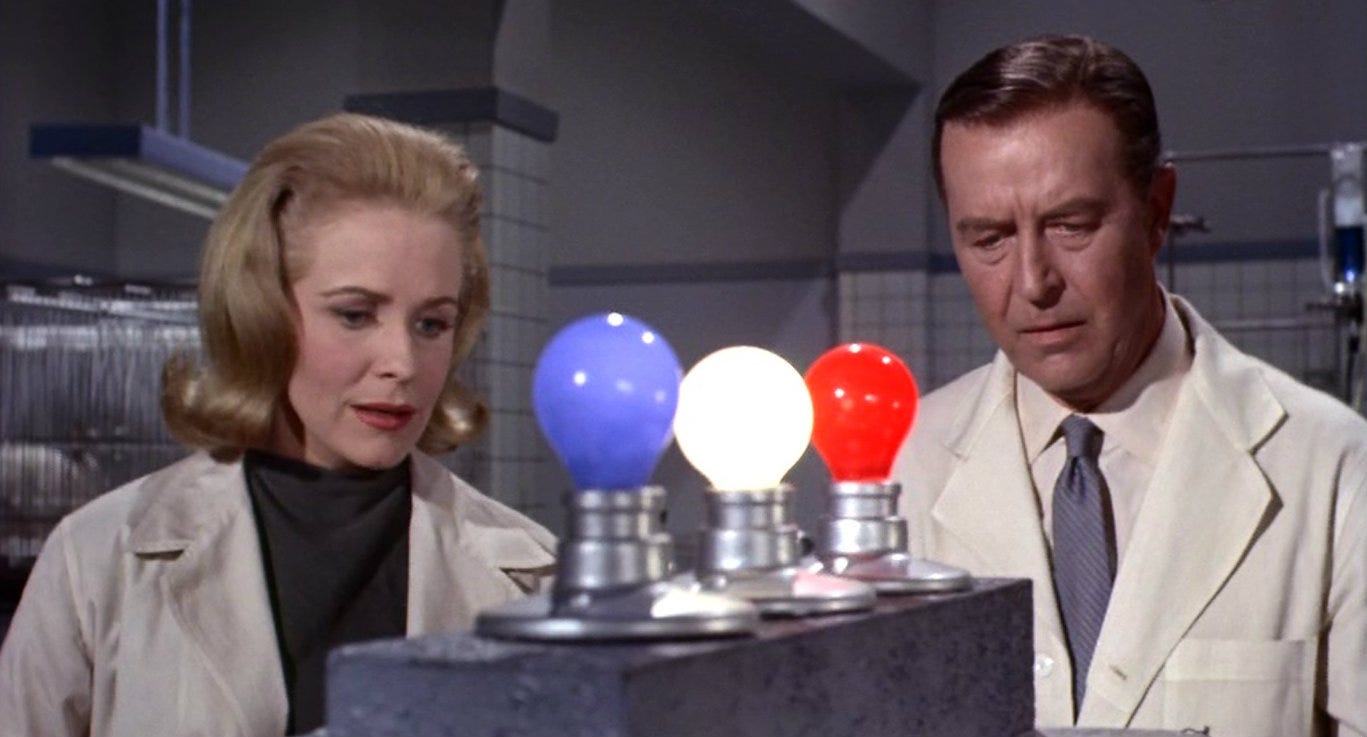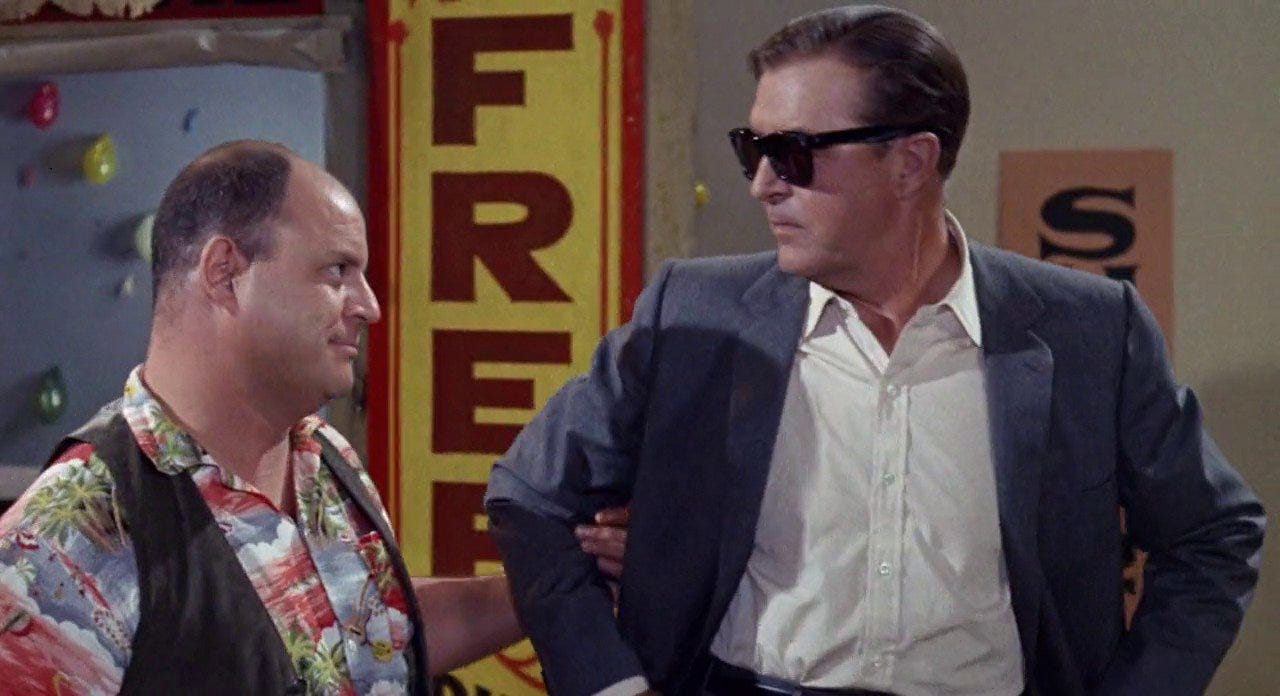Spoilers for X: The Man with X-ray Eyes (1963)
As B-movies go, X: The Man with X-ray Eyes features a surprisingly satisfying thematic throughline. Directed by Roger Corman, and based on one of his own ideas, the film follows Dr James Xavier (Ray Milland) who strives to develop a way to see beyond what he calls ‘the narrow band of visible light’.
During a conversation with his colleague Dr Sam Brendt (Harold J. Stone) at the start of the film, Xavier is chastised for his lofty ambitions.
Brendt: My dear friend, only the gods see everything.
Xavier: My dear doctor, I'm closing in on the gods.
Here we see the very basis of the film. It is essentially an Icarus, as our genius protagonist pushes the scientific method beyond what should be possible. His eyedrops are first tested on a chimpanzee, to prove the progress of the grant-funded experiment to his peer Dr. Diane Fairfax (Diana Van der Vlis). As if to prove Brandt’s warnings, the chimp responds well to the eyedrops, only to drop down dead from a heart attack, apparently seeing something too horrifying to cope with.
If we were to look at a modern comparison, we might compare it with the ending of Pascal Laugier’s 2008 film Martyrs. While the stories diverge wildly, they both deal with pushing the body to the point where we see beyond the physical realm. In both cases, once we reach these godly heights, reality becomes too disturbing for our minds to handle.
Screenwriters Robert Dillon and Ray Russell take Corman’s initial premise and regularly refer back to the idea of ‘closing in on the gods’. After testing the eyedrops for himself, Xavier attends a party with Fairfax and uses his enhanced vision to see through the clothes of the attendees. This provides us with our first godly comparison. Xavier sees the partygoers as a god would see them. The initial joy he takes from this could link to the idea of the Garden of Eden, where Adam and Eve lived naked until eating the forbidden fruit.
It was only after this that they felt shame and covered themselves, both from each other and from God’s eyes.
The link to godliness and wider religion gradually becomes more cynical as the film progresses. After accidentally pushing Brandt out of a window and to his death, Xavier escapes and takes refuge in a travelling funfair, using his enhanced vision to con visitors. Used by a sleazy Don Rickles, a rare early dramatic role for the comedian, he is then forced to act as a healer. His enhanced vision gives him the ability to see real ailments within the desperate people who come to him.
Crane: You're a healer. You can heal.
Xavier: I can't heal. I only look. And I tell what I see.
Crane: Sure. I know what you mean, Doc. But that's enough.
The idea of faith healing being little more than confirming or disproving someone’s hypochondria by saying what they need to hear comes full circle when we reach the final moments of the film. Xavier, having used his enhanced vision to cheat in a Las Vegas casino, attempts to escape the police, but his vision has fully crossed over from the normal spectrum for humans, encompassing the full light spectrum and making it nearly impossible to see clearly – there’s an irony here, that in making himself see everything, Xavier sees nothing.
After wrecking his car, he stumbles out into the desert and hears the congregation of a roaming church group singing. Following the sound, he enters the church and reveals his now fully blackened eyes. The preacher – himself a faith healer – urges Xavier to tear out his sin.
“Said Matthew in Chapter Five, ‘If thine eye offends thee, pluck it out."
Xavier does just this and the film fades to black. An interesting note here is that in Danse Macabre, Stephen King alluded to a scene filmed but never shot, in which after tearing his own eyes out, Xavier cries out that he can still see. Corman denied ever shooting this scene but praised the idea, and it would have certainly fit in with the idea of godliness.
Many religious texts deal with the divide between deities and humans. In Greek myth, Prometheus gives fire to mankind and is punished by Zeus. When Adam and Eve gain knowledge of sin and free will in the Garden of Eden, they are banished. There’s also something Lovecraftian about seeing the forbidden; tearing back the curtain to reveal something ancient that humans were never supposed to be privy to. This is even more so when linked to Xavier’s physical transformation, his eyes gradually blackening.
Director: Roger Corman
Writers: Robert Dillon, Ray Russell
Starring: Ray Milland, Diana Van der Vlis, Harold J. Stone, John Hoyt, Don Rickles









